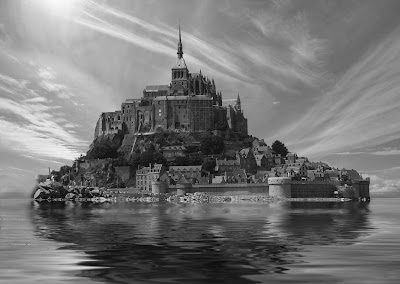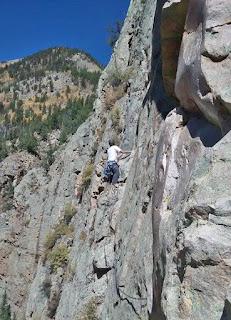 |
| Castle of New America |
It is 1,692 years since the mysterious "Great Death" nearly brought North American civilization to its knees. Humanity has now risen from the ashes. The Union of New America (a tenuous agreement between four semi-autonomous kingdoms) has reached its Tercentennial. With the expiration of the term limit of the wildly popular Supreme Chancellor at hand,, the lords and ladies of the realm coalesce in the capital to vote for her successor. Many, however, fear that chaos may reign unlike any the realm has ever seen.
Vallario
Roberts is the youngest prince of a powerful house who prefers the comfort of
his family’s vast library of books to travelling and adventure. Val parries
criticism from his twin sister and older brother for his obsession with the
“Forbidden Chamber,” a Holy-Grail-like myth. Just when it seems he might unlock
the Chamber’s long-hidden mysteries, however, his family’s castle is overrun by
surprise enemy.
Jeffrey
Greenborne was born a commoner with a dubious backstory but his
record-shattering scores on the “K-Plan” examinations ignite a meteoric rise to
power, leading ultimately to his appointment to the executive throne of the
Kingdom of Pent. This unprecedented promotion engenders a surge of controversy,
and Jeffrey faces widespread criticism and protests. As the war progresses,
Jeffrey reveals an invention he hopes could change the tide of war in their
favor.
Allison
Rose is the sociopathic daughter of a vicious tyrant. Disgruntled with the
disgraceful behavior of his daughter, her increasingly powerful father punishes
her with a marriage to the unattractive son of the
poorest
lord in his kingdom.
In the
northern kingdom of Dehn, Karloh Haldar, a black-skinned captain of an elite
fighting unit, leads two companions on a “supreme secret” spy mission. Using
his immense skill, Karloh uncovers a secret fortress and barely escapes
with his life. With his loyalties torn, he sets course across the war-torn
realm, searching for his nearest ally .
A young
commoner named Josafina Clarke laments her arranged engagement to the awkward
son of a low-ranking baron. Though her friends and parents can’t understand why
she isn’t excited to join the nobility, Josie wishes only for the freedom to
marry who she wishes. In the meantime, she discovers a mysterious book in her
family’s attic that seems to be written in the language of the long-dead
culture, the “Vegar.”
On the
open oceans, a famous cartographer named Hagar Ahnalli moonlights as a drug
smuggler. His latest load of contraband promises to bring him enough wealth to
retire from smuggling forever. To be successful, however, he must elude mutiny,
dangerous enemy ships, and, worst of all, the dark depths of his past.
Deep in
the derelict ruins, Djhaka Hes’ah is the female chief of an unaffiliated tribe
of cannibals. Constantly fighting against the doubt and criticism for being a
woman and for her efforts to upend old customs she views as archaic (i.e.
cannibalism), she displays her strategic and military brilliance.
A poor
merchant named Franco Mulberry is travelling with his recently orphaned
10-year-old niece, Trisha, to a tournament that promises rich financial
rewards. Franco steps uneasily into his role as a surrogate parent and
struggles to strike a balance between his duties to her and his desire to take
advantage of the rich economic opportunity. Franco and Trisha become embroiled
in a besieged city and are caught between the realm’s biggest warring
armies.
In the
farthest southern region of the Union, Jewel Hernandes is the daughter of a
deposed king who was executed for alleged high treason. Resentful by the
erosion of the language and culture of her people, she and her
cousin-turned-lover are plotting to overthrow the “White Usurper” who’s been
put in her father’s place.
A messenger rides deep into the desolate North to deliver a letter from the Supreme Chancellor to a most terrifying destination.
Chapter 1- To the White City
Vallario Roberts and his family arrive in the White City to take part in the Five Years Fair, a massive festival whose ultimate conclusion will be the election of a new Supreme Chancellor
Opinions are like, hmm... well, you know the rest. Everybody has one. Want to share yours? Visit my Speculative Worlds Forum
Follow Me on Twitter!
Sign up for my Mailing List
All writing is the original work of Brian Wright and may not be copied, distributed, re-printed or used any form without express written consent of the author. Find out here how to CONTACT me with publishing and/or use questions
Sign up for my Mailing List
All writing is the original work of Brian Wright and may not be copied, distributed, re-printed or used any form without express written consent of the author. Find out here how to CONTACT me with publishing and/or use questions






